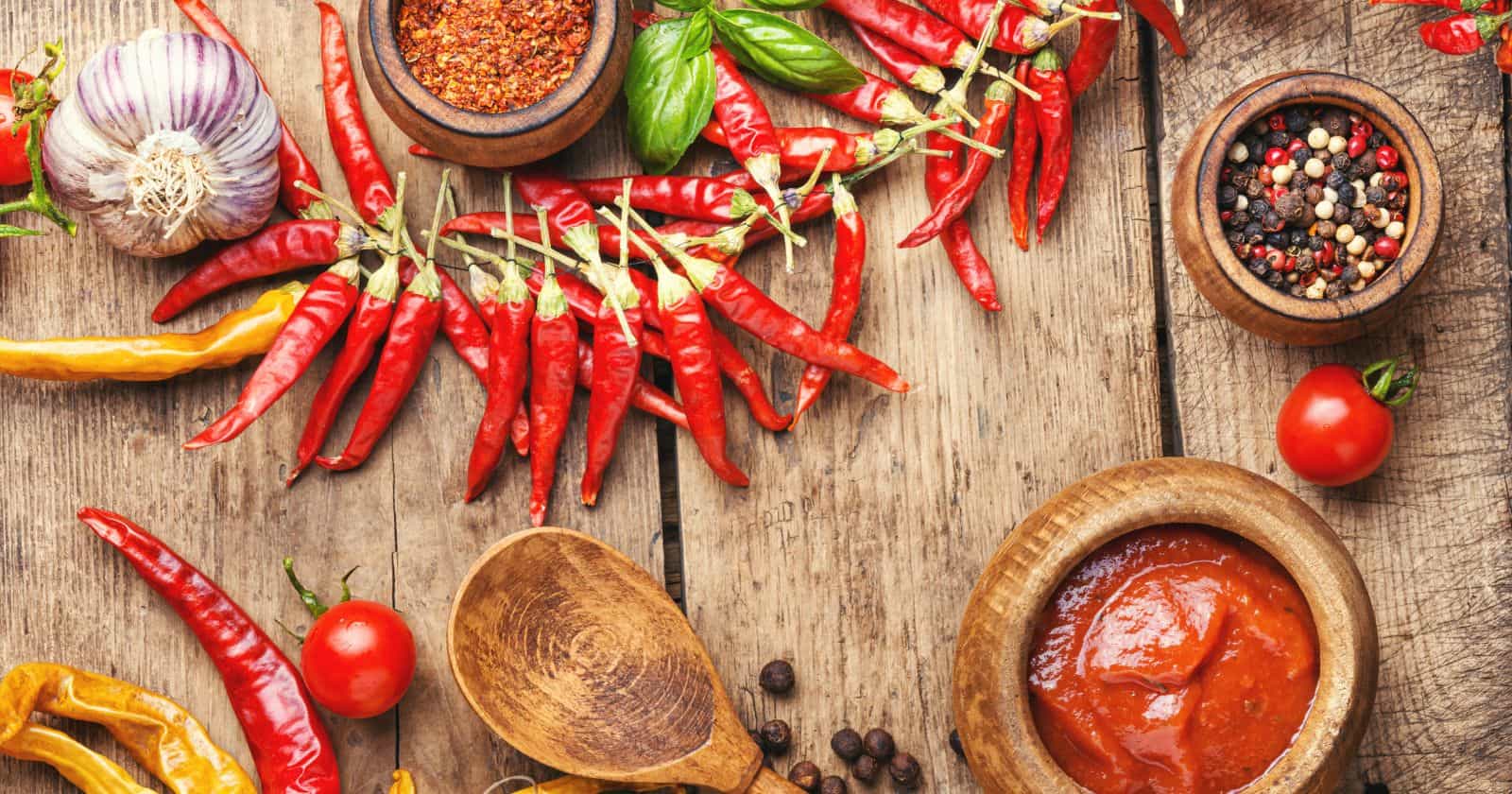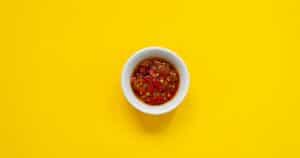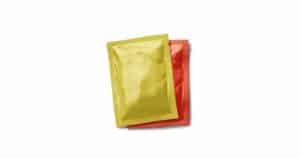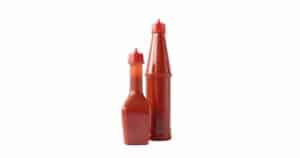Do your palms start sweating every time you take a bite of your favorite spicy wings or hot sauce? You’re not alone. Spicy food lovers know the tell-tale beads of sweat that form on the brow after indulging in something fiery. But why does hot sauce make us sweat in the first place?
It comes down to capsaicin, the powerful compound that gives hot peppers their kick. When you eat hot sauce, capsaicin binds to receptors on your tongue designed to sense heat. This tricks your brain into thinking your mouth is literally on fire, even though the temperature of the food isn’t extreme. To try and cool yourself down, your body initiates its natural cooling system – sweating.
Sweating is your body’s way of regulating temperature by releasing beads of perspiration to cool the skin. The capsaicin in hot sauce makes your body think it needs to kick this cooling system into high gear, causing more pronounced sweating than you’d experience from something mild.
While the amount of sweating varies from person to person, it’s a completely normal bodily reaction. But if you find yourself sweating excessively or experiencing other odd symptoms when eating spicy foods, it’s worth checking with your doctor.
Ready to dive into the science and psychology behind why some people crave the burn of hot sauce? Read on to learn more about the fascinating effects of capsaicin and why we love to eat foods that literally cause us pain.
The Culprit is Capsaicin
The key reason hot sauce leads to sweating is the presence of capsaicin, the compound that gives chili peppers and hot sauce their signature kick.
How Capsaicin Causes Sweating
When you eat hot sauce, capsaicin binds to receptors on your tongue called TRPV1 receptors. These receptors detect heat and pain. So when capsaicin binds to them, it tricks your brain into thinking your mouth is literally on fire, even though the temperature of the food isn’t actually that hot.
To try and cool yourself down from this perceived heat, your body initiates its natural cooling system: sweating.
Sweating as the Body’s Cooling Mechanism
Sweating is your body’s physiological way of regulating temperature. When your body temperature rises, your autonomic nervous system triggers your sweat glands to release beads of sweat onto the skin’s surface. As this sweat evaporates, it cools the skin and lowers your body temperature.
So in essence, the capsaicin in hot sauce fools your body into thinking it’s overheated, prompting it to kickstart the sweating cooling mechanism.
How Much You Sweat Varies
While the capsaicin-induced sweating response is normal, the amount of sweating can vary substantially from person to person.
Individual Differences in Sweating
Some people may experience profuse sweating and dripping perspiration after eating something spicy. For others, the heat-induced sweating may be less pronounced.
These individual differences come down to:
- Genetic factors: Your genetics impact how many sweat glands you have and how sensitive they are to stimuli like heat.
- Tolerance levels: Frequent exposure to capsaicin can make the TRPV1 receptors less reactive to its heat. So the more you eat spicy food, the less you may sweat from it.
- Medications: Certain medications like antidepressants, hormone therapies, and blood pressure medications can increase sweating.
- Medical conditions: Disorders like hyperthyroidism, menopause, obesity, and neuropathy can also heighten sweating.
- Age & gender: Sweating generally decreases with age. Men also tend to sweat more than women.
So while the capsaicin in hot sauce reliably triggers sweating, how much you actually sweat depends on your unique biology.
Other Culinary Culprits Behind Sweating
While capsaicin in hot sauce is the primary trigger, other aspects of your meal can also crank up the sweat response.
Spicy Food Temperature
The temperature of the spicy food itself matters. Very hot or boiling fiery foods will further boost sweat production compared to room temperate servings.
Acidic Ingredients
Spicy foods are often accompanied by acidic ingredients like vinegar and lime juice. Acidic foods lower the activation threshold for capsaicin receptors, enhancing its sweat-inducing effects.
High-Sugar Foods
Interestingly, very sugary foods can also promote sweating. Consuming a lot of sugar prompts insulin secretion which can accelerate perspiration.
So a sweet and spicy wings or sauce glaze can be a double sweat whammy.
Alcohol
Alcohol is another sweat-stimulating accompaniment to spicy meals. Booze causes vasodilation (widening of blood vessels) and increases perspiration.
Is Heat-Induced Sweating Harmful?
While having to mop your brow during a spicy meal may be uncomfortable, capsaicin-triggered sweating is not inherently dangerous or a health concern. It’s simply a normal physiological response triggered by the food.
Signs of Excessive Sweating
However, if your flushing and sweating from hot sauce seems abnormally pronounced or prolonged, it could signify hyperhidrosis – excessive, uncontrollable sweating regardless of heat triggers.
See your doctor if your sweating:
- Disrupts your daily life
- Persists long after eating
- Occurs without triggers
- Is accompanied by chest pain, dizziness or shortness of breath
Enjoy Hot Sauce in Moderation
For most people though, the brief sweaty spell from some Buffalo wings or a salsa is harmless and fades quickly. Just keep your hot sauce indulgences in check. Consuming large amounts of fiery foods at every meal can perpetuate chronic heavy sweating, which carries its own hassles.
Tips to Limit the Sweats
If you adore your hot sauce but want to control the visible aftermath, try these tips:
- Add small amounts of hot sauce and build up slowly
- Opt for milder varieties or dilute with yogurt or milk
- Avoid very sugary and acidic accompaniments
- Stay hydrated with cool water to replace lost sweat
- Wear moisture-wicking fabrics to conceal sweat stains
- Carry a handkerchief to gently dab away sweat
FAQs
FAQ 1: Is sweating after eating spicy food dangerous?
No, sweating from eating spicy foods or hot sauce is not dangerous. It’s a normal bodily reaction triggered by capsaicin binding to your heat receptors. As long as it’s not excessive, prolonged sweating, it’s harmless.
FAQ 2: Why do some people sweat more than others when eating spicy food?
The amount of sweating can vary based on your genetics, tolerance levels, medications, health conditions, age and gender. Some people just have more sensitive sweat glands or fewer capsaicin receptors. Frequent spicy food exposure can also make you sweat less over time.
FAQ 3: Does hot sauce damage your taste buds or hurt your stomach?
No, hot sauce won’t damage taste buds or your digestive tract when consumed in moderation. Your body is equipped to handle capsaicin. But very frequent large amounts may cause temporary irritation.
FAQ 4: What drinks are best to quench your thirst after eating something spicy?
Cool water is effective for rehydration after sweating from spicy food. Milk helps wash away capsaicin. Sugary drinks should be avoided as they may prolong sweating. Avoid alcohol as it can inflame capsaicin’s effects.
FAQ 5: What can you do to stop sweating so much when you eat spicy foods?
Strategies to reduce spicy food-induced sweating include: building up your tolerance gradually, diluting hot sauce, avoiding hot temperatures, opting for milder varieties, limiting sugary/acidic accompaniments, staying hydrated, and wearing moisture-wicking clothing.
The Takeaway
When hot sauce makes you sweat, don’t feel embarrassed. It’s simply your body’s natural physiological reaction to the capsaicin compound. The spicier the hot sauce, the more you’re likely to glisten. But managing your intake and making smart choices can let you enjoy the flavor without the visible sheen.





